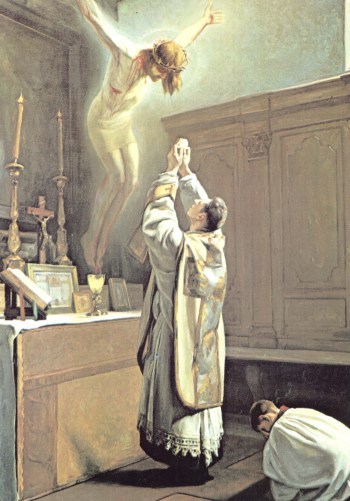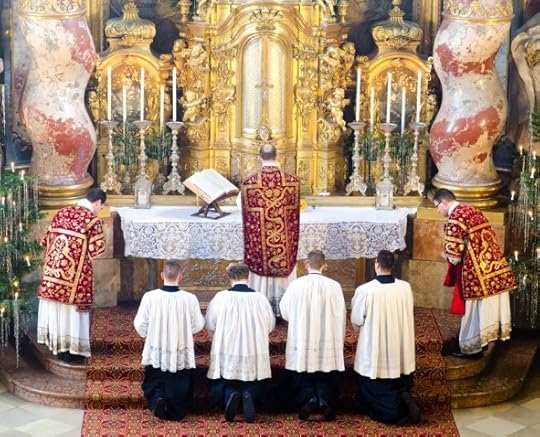Matt Fradd's Blog, page 51
January 28, 2016
Read St. Thomas Aquinas’ Summa Theologica in 1 year!
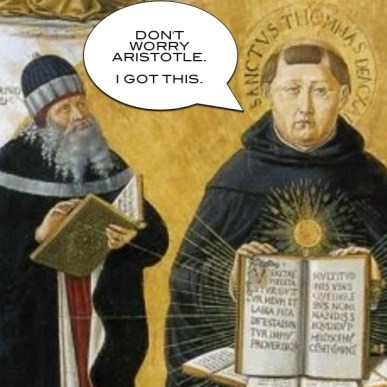
Let’s be honest, if you clicked through to this blog, you probably know what the Summa Theologica is, and if you know what the Summa Theologica is, you’re awesome.
And a nerd.
An awesome nerd.
But just in case, the Summa Theologica (often just called the Summa) is the best-known work of St. Thomas Aquinas (whose feast it is today!).
It synthesizes faith and reason, which, as St. John Paul II wrote in his 1998 encyclical Fides et Ratio, “are like two wings on which the human spirit rises to the contemplation of truth.”
In celebration of the day, En Route Books and Media is bringing you for free the opportunity to read the entire Summa Theologica in only one year.
Divided into 365 parts by a graduate student of Holy Apostles College and Seminary, TJ Burdick, the Summa is more accessible now than ever!
To sign up, simply go here and register for free.
You’ll receive a selection of the Summa every day between now and St. Thomas’s next feast day. Imagine meeting him again this time next year having read for yourself his masterpiece!
PS if you’re interested in learning more about St. Thomas’ 5 proofs for the existence of God? You should read my socratic dialogues here.
January 26, 2016
Totally Awesome Interview With Wicked Cool Catholic Band, Interior Castle

Interior Castle: Joanna on the left, Emma on the right.
Congratulations on clicking through to this article.
You’re about to learn about one of the coolest Catholic bands who refuse to admit publicly that they’re Catholic . . . I’m not sure how many bands there are out there that fit that description, but you can be sure this one’s cooler!
Probably. Almost certainly.
Here’s how their band is described on their site:
Australian/English ‘Dynamic Dream Pop’ duo Interior Castle met in Canada in 2013. Then and there the two became best friends and discovered their complimentary writing styles. They began creating and owning their signature sound of rich harmonies on a bed of intricate guitar work and careful, deliberate poetry.
Oh, and that crazy one on the right over there? The one with the gigantic Mary tattoo on her right arm? . . . That’s my sister.
What follows is an interview between me and them. Interspersed throughout is a few of their music video’s.
ENJOY!
Matt: If you had to pick, who would you say is your favorite brother? Tom or me?
Emma: . . . Isn’t it interesting how people in England spell Favourite* different?
Matt: I’ll take that as a refusal to answer then, shall I?
Emma: . . .
Matt: Good. Okay, well tell me your top 3 musical influences.
Atheists
tryin’ to be cool.
Warpaint (the band, not the method of painting ones face)
Matt: Why did you name your band Interior Castle? Was it named after St. Faustina’s work, “Dark Night of the Soul?” . . . But seriously. Why?
Joanna: One day Emma sent me this quote from St Teresa of Avila:
“I saw in his hand a long spear of gold, and at the iron’s point there seemed to be a little fire. He appeared to me to be thrusting it at times into my heart, and to pierce my very entrails; when he drew it out, he seemed to draw them out also, and to leave me all on fire with a great love of God. The pain was so great, that it made me moan; and yet so surpassing was the sweetness of this excessive pain, that I could not wish to be rid of it. The soul is satisfied now with nothing less than God. The pain is not bodily, but spiritual; though the body has its share in it. It is a caressing of love so sweet which now takes place between the soul and God, that I pray God of His goodness to make him experience it who may think that I am lying.
She also showed me this incredible image to go with it:
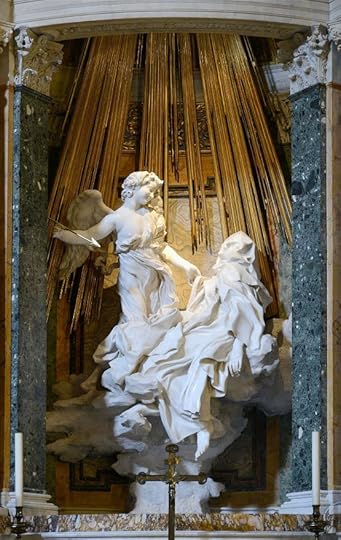
The beauty of this pierced through my own heart, so I became more interested in this mystic and read St Teresa of Avila’s book—Interior Castle.
Emma: It’s cool because a lot of Catholics recognize the name, but to secular people; it just sounds like an incredible band name. Not sure if Joanna mentioned this already, but we are actually spies.
Matt: For a band with such a religious name you don’t sing about religious stuff much, at least explicitly. Is that right? If so, why?
Emma: You are right. We want to reach everyone with our music, including those who don’t know God.
Joanna: We feel that the best way to reach these people is to be in the world but not of it. If we were more explicit about the true meaning of our songs, the message that we are trying to convey might not be as welcomed.
Growing up, we were both super into bands, but not just the music. The music introduced us to the people who wrote those songs, their beliefs, their political views, what interested them. As people we admired, they had a big influence on our own views and this is our aim: for people to be intrigued by our lyrics and dig a little deeper.
Matt: Have you had any cool encounters with the non-believers at bars or something where you’ve played?
Emma: It’s been a good avenue for us to enter into dialogue. We actually usually find christians who ask us if we are christian. We then lead them into a dark room where make them sign a legal document, swearing them to secrecy.
On the odd occasion we are able to chat with agnostics, atheists or people of other religions, they have been quite open to hearing the message behind our songs.
Matt: Out of all of your songs, which is your favourite?
Emma: We’re loving Blurs right now. We love the way the recording turned out. Playing it live is sounding great as well, we are using two different samplers. One for the drums and another for ambient sounds throughout the song. We don’t have a great video for that one online (which is why all the awesome people reading should buy it online) . . . but here’s a live version:
Matt: Tell us about that song. How you wrote it, lyrics, etc.
Emma: Joanna wrote the verse and sent me this little video of her playing it really softly. Her chords were amay-zing, and sounded so dark and different. Then I popped out a chorus taking the line from St Faustina’s diary: “Here is my love with whom I will rest in my grave.” So beautiful. We try to remind ourselves of that every time we go to Mass, enter a church, or meet someone annoying.
Joanna: This song is really about the grace to recognize our weakness before God and is really a prayer for help. Blurring eyes was a reference to death, but death to the selfishness of me. ‘Fill my mouth with your blood, make it run to my heart’ obviously a eucharistic reference, but also a way to reach out to our vampire fanbase.
Emma: To give the song a different feel completely, we wanted to add electronic drums and ambient sounds, so I had a lot of fun creating those bits. There is one sound in particular that is my favourite sound in the world, but it’s really hard to hear unless someone points it out to you, it’s like an alarm drone that sounds like it’s been recorded on a tape machine. Underneath Verse 2. Have a listen.
Matt: What’s another song you like. One that’s on Youtube would be awesome because that way I can stream it for the peeps.
Emma: Get Me Free?
Matt: #Bam!:
Matt: Sweet. Where can people learn more about you?
www.interiorcastleofficial.com
www.facebook.com/interiorcastleofficial
Matt: Why is it that I’m so good looking?
Emma: Well none of your features are too big or too small. You’ve got a good head of hair, you have a lovely smile and straight white teeth.
January 21, 2016
Should We Stop Calling Porn an Addiction?

There’s a lot of debate out there right now about what “addiction” means, if we should apply it to those who use pornography compulsively, and whether it helps or hinders people when we do apply it to them.
Recenlty Dr. Greg Popcak published a blog entitled, “New Research Suggests Porn is NOT an Addiction. It is a Compulsion. Here’s Why That Matters.” Read it here.
A number of people asked me to respond. Here’s my response, not to what Popcak said specifically, but to the whole notion of porn addiction in general.
If you’re interested in learning more, listen to my interview with neurosurgeon Dr. Donald L. Hilton, who does believe we should say porn is addictive).
December 31, 2015
A Meditation on the Reality of Porn Through The Lens of Dante
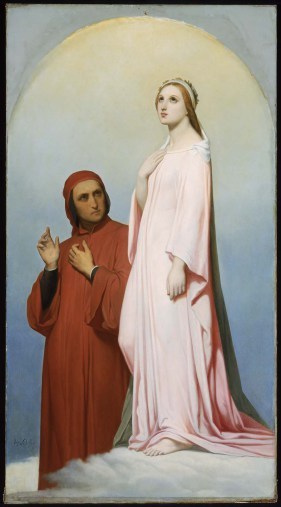
Dante with Beatrice
To the degree in which we recognize the reality behind the fantasy of pornography will we be the degree to which we wish to renounce it.
There is a very interesting moment in Canto XIX of Dante’s Purgatorio which sheds light on the reality of pornography.
Meditating upon it could help us recognize pornography for what it is.
Dante encounters, in a vision, a mysterious woman. The woman represents the abandonment of reason to physical appetite.
Initially Repulsed
When Dante first lays eyes on her she appears hideous. He writes:
“there came to me in a dream a stuttering crone,
squint-eyed, clubfooted, both her hands deformed,
and her complexion like a whitewashed stone.”
In my experience this is usually the reaction people have when they first encounter hard-core pornography. It is jarring, unbeautiful, and unwelcome.
Soon Attracted
What happens next with Dante and the woman is also analogous to what happens with the porn user’s perception of pornography.
Now, keep in mind I’m not making a parallel between the woman in Dante’s vision and any one pornography performer. These porn performers, though they are engaged in a wicked act, are not themselves intrinsically wicked. Instead, I’m making a parallel between the woman in Dante’s vision and pornography per se.
He writes:
“I stared at her; and just as the new sun
breathes life to night-chilled limbs, just so my look
began to free her tongue, and one by one
drew straight all her deformities, and warmed
her dead face, till it bloomed as love would wish it
for its delight. When she thus transformed,
her tongue thus loosened, she began to sing
in such a voice that only with great pain
could I have turned from her soliciting”
While hard-core pornography may at first repulse, if we stare upon it long enough, as Dante stared upon the woman, we begin not only to like it, but crave it. We become intoxicated. Soon, that which should be offensive appears wholesome.
Just as it would have caused Dante great pain to look away, so it is with the man being seduced by pornography.
In Comes Mary
As the woman in Dante’s vision is still speaking, a saintly lady appears at Dante’s side. Though it’s unclear from the text, a plausible interpretation is that she is the Blessed Virgin Mary. Dante says that this Heavenly woman was “poised and eager to heap confusion on the [woman’s] pride.”
She then says to Virgil (who, by the way, in the poem represents human reason . . . a very important point):
“O Virgil, Virgil!” Who, “she cried, “is this?”
Roused by her indignation, Virgil came:
His eyes did not once leave that soul of bliss.”
Just as Our Lady helped Dante, so she wishes to help those of us struggling with temptations to lust and pornography.
Just as Virgil, when roused by the woman to act, keeps his eyes on the woman, so when the pin-pricks of reason begin to wake us from temptation we should remove our eyes from the source of it, and turn them to the Blessed Virgin Mary; to she that “cometh forth as the morning rising, fair as the moon, bright as the Sun, terrible as an army set in battle array?” (Solomon 6:10).
As St. Josemaria Escriva put it, “Before, by yourself, you couldn’t. Now, you’ve turned to our Lady, and with her, how easy!”
The Revealing
Our Lady then summons Virgil to strip this woman of her façade.
“He seized the witch, ad with one rip laid bare
all of her front, her loins and her foul belly:
I woke sick with the stench that rose from there.
I turned them and my Virgil said to me
“I have called at least three times now. Rise and come.”
When a man is tempted to look at porn or is committing the very act of looking at it, his conscience—if he hasn’t almost killed it—is calling out to him, urging him back to sanity. If, by God’s grace, he listens to reason, he will in an instant see the vileness of the act he is committing, rise from where he is, and flee.”
As St. Philip Neri put it, when it comes to the sins of the flesh, it is the coward who is victorious.
Read it for yourself
There’s much more that could be said. Dante is a gold mine! Read the Canto slowly for yourself. You might also find this reflection on the Canto by a good friend of mine, Sebastian Mahfood:
December 22, 2015
The Catholic Priesthood: A Socratic Dialogue
These dialogues aren’t meant to cover every aspect of, or every objection to, each doctrine. There’s more that could be said, obviously.
They’re meant to be a fun and intellectually stimulating introduction to Catholic teachings that can sometimes be hard to understand.
Also, I’ve tried to make it a reasonably fair exchange between Martin (the Protestant) and Justin (the Catholic), but I haven’t tried that hard.
The goal here is to demonstrate the superiority of the Catholic position, something that couldn’t be done in the space I’ve done it in if I were to launch every Protestant objection to the doctrines discussed.
Cool? I don’t think Protestants are cotton-headed ninny muggins’s. Promise.
Enjoy, and please give me your feedback below.
Only One High Priest
Martin: I enjoyed our last discussion about papal infallibility, Justin.
Justin: Me too. What did you want to discuss today?
Martin: Well, another problem I have with Catholicism is your notion of the priesthood.
Justin: Okay. What’s your problem with it?
Martin: Well look, in Hebrews 3:1 and 7:22-27 the author tells us that Jesus is our “high priest” and that there are not “many priests,” but one in the New Covenant—Jesus Christ. Also in 1 Timothy 2:5 it says, “there is one God and one mediator between God and mankind, the man Christ Jesus.” You seem to think a priest can be an “instrument” of God’s forgiveness, which is essentially the same thing as a mediator, thus your notion of the priesthood contradicts the Bible.
Justin: I agree that there is one high priest, Jesus Christ; but that isn’t to say there cannot be other priests, right?
Martin: There is one high priest. There are many high priests. If that’s not a contradiction, I don’t know what is.
Justin: I agree, but I’m not saying that. I’m saying—Because Scripture teaches—that there is one high priest, and that Christians are also priests, though in a different sense.
Flip to 1 Peter with me. Chapter two, verse five: “and like living stones be yourselves built into a spiritual house, to be a holy priesthood, to offer spiritual sacrifices acceptable to God through Jesus Christ.” Skip down to verse nine, “But you are a chosen race, a royal priesthood, a holy nation, God’s own people.”
So does the bible contradict itself, or should we agree that Christians are members of a holy priesthood and that this isn’t in conflict with what it teaches about Jesus being high priest?
Universal/Ministerial Priesthood
Martin: Yes, we should agree on that, but when Catholics mean priest they mean something different, don’t they? I mean, if you didn’t, then all Catholics could celebrate the Mass and hear confession.
Justin: It’s true that Catholics distinguish between a universal priesthood of all believers and a ministerial priesthood, but what I’ve shared is enough to refute your claim that since there is only one high priest, there cannot be priests in any other sense.
Martin: Well why make the distinction in the first place?
Justin: Because, just as in the Old Covenant, God chose to call a special priesthood out from among the universal priesthood to minister to his people, so has he chosen to do so in the New Covenant.
Martin: Just as in the Old Covenant?
Justin: That’s right. In that verse we just read from St.Peter, he references Exodus 19:6 where God said that Israel was to be “a kingdom of priests and a holy nation.” Just as there was a universal priesthood among the Old Testament people of God, so is there among the New Testament people of God. And just as the universal priesthood in the Old Testament didn’t preclude there being a ministerial priesthood within that universal priesthood (see, Numbers 3:1-12, and Exodus 19:22, for example) so to in the New Testament.
Martin: Okay, But just because there may have been a distinction in the Old Testament, that doesn’t mean there has to be that distinction today.
Justin: I think that’s right. But let’s pause a moment and consider the ground we’ve covered.* You now agree that the high priesthood of Jesus Christ does not preclude there being priests in any other sense. You also agree, I think, that in the Old Testament there was a distinction between the universal priesthood and ministerial priesthood. Since that were true in the Old Covenant, it’s at least possible that it’s true today, yes?
Martin: Possible doesn’t mean probable.
Justin: I know, I know. But one step at a time.
Justin: Do you mind if I recommend an article for you to read?
Martin: Sure.
Justin: I have it in my bag here. Here you go, it’s called, “The Priesthood Is Both Ministerial and Universal” by Tim Staples.
Martin: I have to get going. Let me know what you think of the article.
Justin: What about my point about 1 Timothy 2:5 and how saying a priest can be an instrument of God’s forgiveness contradicts Jesus being our one mediator.
Martin: Perhaps next time we meet we can discuss the sacrament of confession. Suffice it to say, just as Jesus being our one high priest does not preclude you and I being a part of the universal priesthood, so Jesus being our one mediator between God and man doesn’t preclude us participating in that mediatorship. I think the four verses leading up to Timothy 2:5 make that clear. There St. Paul urges us to offer prayers for all people. When we offer prayers for other people are we not taking somewhat of a mediatory role? Yes, but not in a way which usurps the unique mediatorship of Christ.
Look, sorry to run. I have to get going. See you next time.
* Sometimes we go into these sorts of conversations with the sole goal of having our interlocutor agree entirely with whatever it is we’re arguing about. This can be unhelpful. I don’t think I’ve ever been in a conversation with someone who has right then and there changed his mind about some important issue related to his faith—I bet you haven’t either. I don’t think we should expect that. Knowing when to back down and refer elsewhere—as Justin did with Tim’s article—can be helpful. People—you and me included—need time to process important ideas in an non-defensive environment.
December 18, 2015
[Video] My New Talk: No Man Is an Island
Friendship. That’s what this talk is all about. I gave it earlier this year in Toronto, Canada. I hope you enjoy it.
Half way through the talk I show a Youtube clip about Hikikomori (I explain what that is in the vid). Here is that video so you don’t to squint at it in the one above.
December 8, 2015
The Year of Mercy: In 60 Seconds. In Lego!
Saw a great little video today which explains the year of mercy in 60 seconds. In lego. Awesome.
December 4, 2015
From Ordinary to the Extraordinary: Why Men are Drawn to the Latin Mass
Sam Guzman, founder of The Catholic Gentleman, and I recently say down for a “fireside
chat” about the extraordinary form of the Mass (the Latin Mass, colloquially). It’s about 30 minutes.
Enjoy!
November 29, 2015
8 Advent Songs to Remind You It’s Not Yet Christmas
Here are eight beautiful songs to remind you that it’s not yet Christmas.
Viva la Advent!
1. O Come O Come Emmanuel
2. O Come Divine Messiah
3. Come Thou Long Expected Jesus
4. Ave Maria
5. Come Thou Fount
6. Every Valley Shall Be Exalted
7. Hark! A Thrilling Voice is Sounding
8. Veni Veni Emmanuel (Latin version)
November 23, 2015
Is Jesus Just a Legend?: A Socratic Dialogue
 These dialogues aren’t meant to cover every aspect of, or every objection to, each issue discussed. There’s more that could be said, obviously.
These dialogues aren’t meant to cover every aspect of, or every objection to, each issue discussed. There’s more that could be said, obviously.
Instead, they’re meant to be a fun and intellectually stimulating introduction to Christian beliefs that can sometimes be hard to understand.
Also, I’ve tried to make it a reasonably fair exchange between AJ (the atheist) and Lucy (the Christian), but I haven’t tried that hard.
The goal here is to demonstrate the superiority of the Christian position, something that couldn’t be done in the space I’ve done it in if I were to launch every skeptical objection to the issues discussed.
Cool? I don’t think atheists are cotton-headed ninny muggins’s. Promise.
Enjoy, and please give me your feedback below
AJ: Even if you could convince me God exists, you’d still have to prove that your Jesus—and not Zeus, Osiris, or the flying spaghetti monster—is God.
Lucy: That’s right. But one step at a time. What would you think of someone who tried to explain advanced algebra to someone who denied basic arithmetic?
AJ: Atheists are too stupid to handle an argument for Jesus?
Lucy: That’s not at all what I meant. But way to be defensive!
AJ: Might it be that you’re avoiding the question because you know it’s a lot easier to trot out a syllogism for a first cause than to make the case for Jesus’ divinity?
Lucy: I’m going to stick with the reason I gave. Trying to explain the hypostatic union, for example, to an atheist is like trying to teach someone, as I said, algebra who denies basic arithmetic.
AJ: But if Jesus is who you say he is, why don’t you argue for that? If you’re successful and convince me that Jesus is God, it would follow, obviously, that God exists after all! Two birds with one stone.
The Trilemma
Lucy: Fine. We can talk about that. The Jesus we encounter in the New Testament made some radical claims about himself. When we consider these claims I think we have three options: 1) He’s either a liar . . .
AJ: Oh, dear.
Lucy: Rude!
AJ: He’s either a liar, a lunatic or the Lord. I can’t believe you’re trotting that old argument out.
Lucy: Why does the validity of an argument have to do with how long it’s been around?
AJ: It doesn’t
Lucy: All men are mortal. Socrates was a man . . .
AJ: Okay, it’s not that it’s old, it’s that it doesn’t work.
Lucy: Show me how.
Fourth Alternative: Jesus Never Existed
AJ: Here’s the main problem I see with Lewis’ argument. His trilemma is a false one. There’s another option. Maybe Jesus never existed, or, if he did exist, perhaps so much legend had built up around him that we can’t trust the gospels. If that’s true, then the argument falls apart.
Lucy: Okay. That’s a fair point. Then what about this. If Jesus is not the Lord, as I think the New Testament clearly shows, we have three options:
He was a liar, a religious fraud who knowingly made false claims.
He was a lunatic, someone who was sincere but deluded.
He was a mere legend and didn’t exist at all.
AJ: . . .
Lucy: AJ?
AJ: I’m thinking. Let me get a pen. Okay. I’m okay with this. Those do look like the only options. But, you’re presuming something that I’m not convinced of.
Lucy: What’s that?
Jesus Claimed to be Divine?
AJ: That Jesus actually claimed to be God. Or that, as you say, the New Testament “clearly shows” he’s God. If that’s true. And if you can show me that the New Testament is reliable, then I’ll agree we have two options left. That he’s a liar, or that he’s insane.
Lucy: Well, let’s take a look at a few of the passages where Jesus claims to be more than just a wise teacher, more than human. In Matthew 11:27 Jesus claims to have an absolute and unique relationship with the Father. He says, “All things have been delivered to me by my Father; and no one knows the Son except the Father, and no one knows the Father except the Son and any one to whom the Son chooses to reveal him.”
In John 8:58 he says, “Truly, truly, I say to you, before Abraham was, I am.” Not only does he claim to have lived before Abraham, who lived thousands of years before him, but he attributes to himself the divine name, I AM. What do the Jewish leaders do in response? Try to stone him. They knew exactly what he meant.
AJ: Anything else?
Lucy: So much more. We don’t have time to get into all of them if you want to look at those three options we spoke about. So what would you like to do. Focus on this point, or move on? I have to get to class in about an hour and a half.
AJ: Okay, well let’s move to those three options then. Perhaps Jesus never existed, or, if he did and claimed to be God the only other two options are 1) he’s a liar or 2) insane.
The Reliability of the New Testament
Lucy: Let’s talk first about the reliability of the New Testament.
AJ: Fine.
Lucy: The New Testament was written within the first generation after the death of Christ, while the eye witnesses were still alive. We therefore have better sources for Jesus than we do for most of the major figures of history. Our earliest biographies of Alexander the Great were written by Arrian and Plutarch, 400 years after his death, but historians don’t doubt that Alexander the Great existed or that we have a basic knowledge of his life.
AJ: You’ve done your home work!
Lucy: I’m a theology major.
AJ: Oh, are you minoring in unemployment?
Lucy: Not as long as there are people like you to convert.
AJ: Hashtag Burn! You talk about Alexander the Great and others who historians accept as having actually lived, but the difference between those people and your Jesus is that they didn’t claim to be God! Maybe little evidence is sufficient to establish their historicity, but much more is needed to establish some carpenter dude who apparently raised the dead.
Lucy: We’re not yet asking the question, was Jesus God? We’re simply considering whether the New Testament is basically reliable. Perhaps it’s reliable and wrong! Right? But one step at a time. Another thing worth taking into account is that the New Testament documents are better attested than any other works of antiquity.
AJ: Better attested?
Lucy: We have them early, and we have more of them than any other ancient work. For example, we have five hundred manuscripts that are dated earlier than a.d. 500. The next best attested ancient text we have is Homer’s epic poem The Iliad, of which we have only fifty copies that date within 500 years of its origin. And the multiplicity of New Testament manuscripts that we have enable us to check them against each other and ensure that they have been reliably transmitted to us, with very few variant readings. This means that they reliably communicate their original message and are not a conglomeration of legends that built up slowly over time.
Non-Biblical References to Jesus
AJ: That’s a lot of information. Of course the thing is these authors were religiously motivated, right? What about sources outside the Bible? Anything?
Lucy: You’re right, that is a lot of information, and you dismissing it with a “but that’s the Bible” is just arrogant, honestly.
AJ: Arrogant huh?
Lucy: And pig headed. Look, every historian is motivated by something, every historian wrote from a particular point of view. Think about Jewish historians, right? When they write about the Holocaust, they have a point they’re trying to make—and to defend against neo-Nazis who are equally as passionate on their take on what happened—But to dismiss their work as unhistorical because they’re biased would be simply unfair. Similarly, to dismiss the authors of the New Testament because they were trying to convey something they were convinced about is just to display an unfair prejudice against the New Testament.
AJ: Okay, fair enough then. But is that a no? Did non-Christians write about Jesus around the first and second century?
Lucy: Yes, as a matter of fact. You can read about Jesus of Nazareth, Pontius Pilate, and even John the Baptist from non-Biblical sources of the period, such as the writings of the Jewish historian Flavius Josephus (AD 37-c. 100). Other early authors who make reference to Jesus and the early Christian community include the Roman official Pliny the Younger (AD 61 – c. AD 112) and the Roman historians Tacitus (AD 56 – AD 117), and Suetonius (AD c. 69 –c. 122).
AJ: Wow. Okay. didn’t know that.
Lucy: Look at you admitting you didn’t know something. I’m impressed.
AJ: Like I keep telling you, Lucy, I’m an open-minded guy. Okay. Another question for you. Let’s say you’re right.
Lucy: Done.
The Witness of the Apostles
AJ: Not finished. Let’s say you’re right about Jesus claiming to be God and the New Testament documents being reliable. Still it could be false, right? I mean, I’m a Green Lantern fan. See this graphic novel? I can give you an air-tight argument for how it came about, why we have good reasons for thinking the text hasn’t been changed since it was first penned . . . but it’s not true. Hal Jordan is a fictional character. Maybe the apostles started spreading the story of this Jesus because they had nothing better to do. Maybe this explain why other non-Christian historians heard about him and mistakenly believed that he actually existed.
Lucy: Why would the apostles, or anyone for that matter, make up a story like this. You’ve already said boredom—which I think’s a little insulting, but that’s okay. What else?
AJ: They wanted power! They wanted people to listen to them; fame, riches, the typical stuff.
Lucy: Yeah, see the problem with this is that when you read about the first followers of Jesus in the New Testament, you read about people who were weak, stupid, and cowardly. The chief apostle get’s called Satan (Mt. 16:23); they constantly misunderstood Jesus (eg. Jn 4:31-34); they all abandoned him when he was arrested and crucified (Mk 14:50). Hardly what you’d expect them to convey if they were after power and fame.
Further more, to say the apostles made up the story of Jesus’ life, death, and resurrection, you must also be willing to say that they endured horribly painful deaths, including being flayed alive, crucified, stoned, and beheaded for what they knew to be a myth.
These, and many other reasons, make it clear why, according to eminent historian Michael Grant, “no serious scholar has ventured to postulate the non-historicity of Jesus’—or at any rate very few, and they have not succeeded in disposing of the much stronger, indeed very abundant, evidence to the contrary.”
AJ: Okay, let’s say you’re right. Let’s say the New Testament is reliable, and Jesus did claim to be God. Show me why he wasn’t a liar or insane. Those are the only options left, right? And honestly, both sound more plausible than what you believe.
Lucy: Unfortunately I have to run. Same time tomorrow?
AJ: see you then.
Matt Fradd's Blog
- Matt Fradd's profile
- 168 followers


